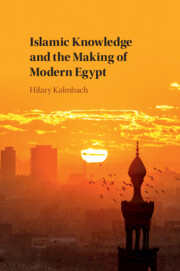Book contents
- Islamic Knowledge and the Making of Modern Egypt
- Islamic Knowledge and the Making of Modern Egypt
- Copyright page
- Dedication
- Contents
- Figures
- Acknowledgements
- Preface
- Notes on Transliteration and Use of Arabic
- Introduction: Hybridity, Islamic Knowledge, and ‘Being Modern’ in Egypt
- 1 Reform, Education, and Sociocultural Politics in Nineteenth-Century Egypt
- 2 Dar al-ʿUlum: Hybridity, Education, and Sociocultural Change, 1871–1900
- 3 Hybridity, Islamic Knowledge, and the Formation of Egyptian National Culture, 1882–1922
- 4 Fighting over the Future of Egyptian National Culture, 1923–1952
- Conclusion: Authority, Authenticity, and Revolution
- Book part
- Bibliography
- Index
Conclusion: Authority, Authenticity, and Revolution
Published online by Cambridge University Press: 02 October 2020
- Islamic Knowledge and the Making of Modern Egypt
- Islamic Knowledge and the Making of Modern Egypt
- Copyright page
- Dedication
- Contents
- Figures
- Acknowledgements
- Preface
- Notes on Transliteration and Use of Arabic
- Introduction: Hybridity, Islamic Knowledge, and ‘Being Modern’ in Egypt
- 1 Reform, Education, and Sociocultural Politics in Nineteenth-Century Egypt
- 2 Dar al-ʿUlum: Hybridity, Education, and Sociocultural Change, 1871–1900
- 3 Hybridity, Islamic Knowledge, and the Formation of Egyptian National Culture, 1882–1922
- 4 Fighting over the Future of Egyptian National Culture, 1923–1952
- Conclusion: Authority, Authenticity, and Revolution
- Book part
- Bibliography
- Index
Summary
This chapter considers Egyptian sociocultural politics in the run-up to the revolution of 1952 and beyond. Dar al-ʿUlum’s victory in the culture war was cemented in 1946 when it became a fully fledged faculty of the University. Furthermore, the immense impact of the darʿamiyya on fields related to Arabic, Islam, and education gives them a stronger claim than Europhile modernists to the legacy of Islamic modernist Muhammad ʿAbduh. Their histories demonstrate that schools can be the key to understanding social and cultural histories, that hybridity is a major engine driving sociocultural change, and that Islamic knowledge was most authoritative in colonial and postcolonial contexts when expressed in explicitly modern, ocularcentric ways. However, efforts by alumni to defend the school and its legacy in the decades since demonstrate the lasting sting of Husayn’s critique. As early as the 1926 dress strike, Hasan al-Banna decided to take his ability to be modern and religious in a different direction. Yet, considering him alongside the bulk of the darʿamiyya makes it clear that the role of the Muslim Brotherhood during the 2011 Revolution needs to be viewed within the 130-year history of engagement between Islamic knowledge and Egyptian modernities.
Keywords
- Type
- Chapter
- Information
- Islamic Knowledge and the Making of Modern Egypt , pp. 206 - 222Publisher: Cambridge University PressPrint publication year: 2020



